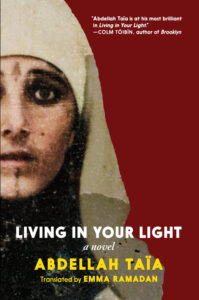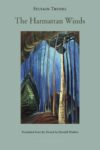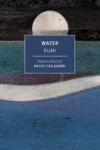
[Seven Stories Press; 2025]
Tr. from the French by Emma Ramadan
“I am Malika,” the heroine of Abdellah Taïa’s Living in Your Light proclaims, “I am strong. That is what you will love about me.” Love, here, is a command. Malika has no use for jealousy, fear, or weakness. She eats sugar-coated donuts in public, conjures the dead, and speaks with eels. She has no need for the pity of others.
Living in Your Light is Taïa’s eleventh book, and his sixth to be brought into English, this time through Emma Ramadan’s translation. The novel consists of three episodes. Each is set in a different area of Morocco — Béni Mellal, Rabat, and Sallé — and is structured through conversations. Part one is a strident second person monologue in which Malika addresses her dead husband Allal. Throughout part two, Malika engages in an unspoken “duel” of the wills with a French woman named Monique–this episode is like an internal rant, an extended curse. Part three, by contrast, is almost entirely dialogue; Malika must negotiate with a thief named Jaâfar who has broken into her home. The plot, then, is Malika’s life, rendered through these polymorphous conversations.
Malika’s character stems from a real-life source. Taïa tells us in the dedication page that Malika “speaks and screams” with the voice of his own mother, M’Barka Allali. M’Barka, whom Taïa has described as a powerful, hard, sweet, and illiterate woman, is the writer’s most enduring influence. When he writes, Taïa claims, it is often M’Barka’s voice that comes out.
All-powerful mother figures are a constant in Taïa’s works. In A Country for Dying (tr. Emma Ramadan), Zahira’s mother governs the household, as the father lies forgotten in a peripheral room of the apartment. “She scares me, your mother,” Zahira’s lover Allal confesses, “She transforms men into statues, into sand, and she stomps all over them.” In Infidels (tr. Alison L. Strayer), the narrator’s maman is equally as assertive, claiming her son with violent intensity: “My son is mine. He likes what I like. He’s my memory and my forgetting. He’ll like what I tell him to like. He’ll be what I tell him to be.” Her son doesn’t protest, seeming to accept that his mother determines his life. The mother in An Arab Melancholia (tr. Frank Stock), meanwhile, is summed up through her arresting scent, “a strong, human, disturbing, possessive smell.”
Taïa’s autofictional mothers are often sex workers, migrants, and heads of household. They are skilled in the arts of sorcery and sex, are “sisters” to Marilyn Monroe, and are models of fierce dignity. Above all else, they are women flush with contradictions. They work ceaselessly to provide for their children and endure abuse, poverty, rape, and torture for the sake of their families. Yet they are often cruel to those same loved ones, or fall silent at critical moments, as in A Country for Dying and Infidels, when their sons are raped by older men. Taïa does not resolve these painful contradictions; he makes the tension between tenderness and violence one of the central motors of his work.
Queerness is another theme that shows up regularly in Taïa’s writing, one that really blooms in Living in Your Light. Malika knows that her first husband, Allal, has long had a sexual relationship with his male friend, Merzougue, but she insists that she is not jealous. She considers the homoerotic bond between men to be a natural, timeless supplement to heterosexual marriage. “One shouldn’t ask too many questions,” she says, dissipating the issue with apparent ease. Other instances of male homoeroticism abound. Georges, the French father of Malika’s rival Monique, has a romantic relationship with a Moroccan man named Jelloul. Jaâfar, the thief who breaks into Malika’s Sallé home, tells her that he fell in love with two men while in Zaki Prison—the prison warden, T’Hami, and the prison cook, Marwan.
At each stage of Malika’s life, in Béni Mellal, Rabat, and Sallé alike, same-sex desire is presented as quotidian and ubiquitous. In the novel, queerness moves as a kind of “secreto abierto” –a phrase that poet and literary theorist Rosamond King uses to describe the collectively understood, yet largely unspoken knowledge of individuals’ same-sex desires. This “open secret” renders queerness tacitly permissible through lack of public acknowledgment. There is one instance of queerness, however, that Malika refuses to accept: that of her son, Ahmed. Seeking the “freedom” to live as a queer person, Ahmed has exiled himself to France, cutting off contact with his home country and his mother.
Malika’s pain at the loss of her son is evident. She wants him to come back to her and to Morocco. She insists that she was supportive of him: even though he was “peculiar” she didn’t throw him in the street, or stop him from going to school. But when a young man from the Hay Salam neighborhood urges her to acknowledge her son as zamel, a Moroccan Arabic word that Ramadan glosses as “gay” in her translation, Malika refuses. “Don’t say that word in front of me,” she bristles. “I won’t say the dirty word.”
Malika’s intransigence on this count is devastating. She knows that her choice not to accept Ahmed fully only cements the distance between them. But she cannot let go of her own convictions in order to make room for the reality of her son’s life. “Ahmed is my son,” she tells Jaâfar, “But I can’t bow down before him. I am who I am. Malika.” Her indomitable strength is also her Achilles’ heel.
Like Ahmed, Taïa grew up zamel in Morocco. He chose to leave as an adult, seeking to establish himself as a writer and filmmaker in Paris. In a famous letter he penned for the French-language Moroccan news magazine TelQuel in 2009, Taïa addresses his mother across this distance, explaining his homosexuality as a form of rebellion that he learned from M’Barka herself. “I need you to know that I am like you,” Taïa writes, “Not in the same revolt as you but, like you all the same.” It is a sentiment that Malika, in Living in Your Light, seems to echo, but in reverse: “In the end, Ahmed is the only one who resembles me. He was by my side over the years and I didn’t see that he was the one who learned the most from me…Ahmed is like me too, like his mother Malika.” In his TelQuel letter and in his fiction, Taïa seems to make a similar argument: queerness is not a deviation, but an inheritance; the will to transgress is a trait that is passed on from mother to son.
In the novel, Malika’s primary transgression is to disrupt gender norms. Malika is frequently more masculine than her husbands are. Her first husband, Allal, won’t refuse his parents when they push him to fight for the French colonial army in Indochina. “You’re a man,” Malika tries to convince him, “You can say no. You will say no to your parents […] Shed the submission.” But Allal is complacent, and Malika resolves to make herself hard to counteract his softness, thinking: “Be firm, Malika. Be mean. Be a man in Allal’s stead.” Internally, she scorns men for their frailty, for their tendency to get caught up in false illusions, like the fickle promises of manhood, nationalism, and freedom itself.
Queerness takes on yet another valence in the novel’s second section, which focuses on Malika’s “battle” with a white woman named Monique. Monique, born and raised in 1930s Casablanca to settler colonial parents, returns to Morocco as an adult to try to make sense of her past. In the process, she comes into contact with Malika’s family. Monique is ever-smiling, generous with her money and belongings, and fluent in Moroccan Arabic, and gradually, Malika’s family is taken in by Monique’s charm. But Malika takes offense at Monique’s attempts to help her family, and strikes back against the French woman in her narration:
I am not gentle Malika. I am not the Arab woman she thinks I am. I will not smile…She wants to set the rules of the game. Act like the French mistress? Mistress, but kind. Mistress, and sweet … I’m not impressed. I won’t let myself be dominated so easily … Make her stop acting as if she’s benevolent toward us. Make her stop. We don’t need her pity, definitely not her understanding. Make her lower her gaze and even her head. That way, I can devour her with my eyes, at last. Make her drop the mask of the modern French woman who is so touched by the simplicity of Moroccan life. Colonization has been over for almost a decade now. Why does she insist on staying here?
Malika’s virulent rejection of Monique and her “mask” is refreshing to read. In just a few sentences, Malika places Monique’s kindness, benevolence, and pity within a larger history of French colonization–which lasted officially from 1912 to 1956 in Morocco. “Nothing is ever forgotten,” Malika thinks. “The past is always the past.” Malika does not need Monique to save her; she wants the French woman to keep her distance. She does not believe in the illusion of a benevolent French woman in postcolonial Morocco.
Yet, there is an undertone of sensuality in the showdown between the two women. One blazing hot afternoon, Malika and Monique meet at the Chellah ruins in Rabat, where Malika plans to take vengeance on her French adversary. But as they are about to begin their metaphorical “duel,” a wind comes up, and blows through Monique’s clothing, before passing on to Malika.
“It slips under my green djellaba and enters all of me. The same wind that was all around Monique is now present in me. It’s soft, it’s good. I don’t resist. I put my transparent black veil over my face. And I let myself be invaded by the wind. I consent. Enter all of me. Enter. And, like Monique, I close my eyes.”
Malika and Monique are both touched by the same wind, under the same burning sunlight. The wind acts as an erotic force, facilitating a kind of momentary, queer intimacy between the two. Here, the words “consent” and “enter” imbue the two women’s interaction with queer possibility, constituting one of the rare moments of female homoerotic frisson in Taïa’s books. But this is not an enemies-to-lovers subplot; Malika is not seduced. Instead of fanning the flames of desire and passion between the two women, the wind actually snuffs out Malika’s fiery hatred for Monique. “There is no more animosity now,” Malika thinks, “We are equals.” Through this queer experience, Malika is not led to a new identitarian category (like zamel), but rather is able to disrupt the normative power imbalance between colonizer and colonial subject — at least for a moment.
What this excerpt also illuminates is the quality of Taïa’s prose. Living in Your Light is rhythmic. The sentences are short, and the scenes are brief and imagistic. Emma Ramadan, the translator of Living in Your Light and the 2021 PEN Translation Award-winning Taïa novel A Country for Dying, has compared Taïa’s prose to that of French novelist Marguerite Duras. Both writers have a steady, poetic cadence to their words, and fixate on certain character pairs: for Taïa, it is the mother-son dyad that is endlessly revisited; for Duras, it is the relationship between sister and brother that is an ongoing preoccupation. Like Duras, Taïa also composes chapters through vignettes, and both authors tend to split their works into three parts. (It should be noted, once again, that Taïa refuses the idea of literary influence, arguing that the voices of his sisters and mother most directly impact his work).
But while Ramadan admits to nursing a translator’s obsession for Duras, she is also emphatic about the need for French-to-English translation of authors and books from outside of France. For over a decade now, Ramadan has brought francophone North African writers like Ahmed Bouanani, Meryem Alaoui, Fouad Laroui and Kamel Daoud into English, aiming to augment and diversify the sparse representation of the region in the literary anglosphere. For Ramadan, translating francophone writers from countries other than France is a top priority, even a “responsibility.” Writing for Words Without Borders several years ago, Ramadan noted that only a fraction of books in translation from French come from outside of Europe and Canada (in 2015, that number was 8.8%), and that, as of 2016, there were only around thirty Moroccan writers (from French, Arabic, and local dialects) available in English translation.
Ramadan translates to bring “absent bodies, absent books, absent stories” into English. “As a translator,” Ramadan writes, “I am trying to ask who is not being represented, what kind of literature is not being represented, and then I try to fight that absence.” Taïa’s books do precisely this representational work for the anglophone literary world; his writing is full of queer, Muslim Moroccans, nonmen, and migrants from across North Africa and the Middle East, none of whom are in need of western pity or saving.
It seems that many of the specific translation questions that arise in Living in Your Light have to do not with French, but with the cultural, historical, and linguistic particularities of Morocco. In Taïa’s French version, Vivre à ta lumière, transliterated Arabic words, like baraka, mektoub, meskine, and zamel, dapple the text. Ramadan maintains this linguistic plurality, making visible the multilingualism inherent in Taïa’s work, and adds further heft to it, by occasionally adding a gloss of certain terms, like adding in the word “gay” as an explanatory comma for zamel. Ramadan also introduces footnotes to the text, giving anglophone readers context for some of the book’s key historical and cultural figures, items of Moroccan clothing, or even the chahada, the Islamic declaration of faith. At first I felt these footnotes to be overkill, but later relished Ramadan’s paratextual addition for the depth of engagement with the novel’s Moroccan context they allow.
In all, Living in Your Light feels like Taïa’s most accomplished (translated) work thus far. Taïa reuses many of the character names, scenes, and plot points from his past books in this novel, but here the juxtaposition of these imagistic scenes is uniquely symphonic. I think, ultimately, what makes Living in Your Light so luminous is the resonant narrative voice of Malika. It is Taïa’s ability to channel his mother M’Barka through Malika that lends a direct, true quality to the book. It is doubly painful, then, that the fictionalized versions of Taïa and his own mother (Ahmed and Malika) do not reconcile in the book’s pages. Malika has dramatic encounters with a variety of people throughout Living in Your Light, but the conversation she most needs to have — with Ahmed, her zamel son — is the one that is absent.
“I am Malika,” our narrator proclaims at the story’s opening, “I am strong. This is what you will love about me.” By the novel’s end, though, Taïa has shown us the solitude that lies at the heart of Malika’s strength.
Anna Learn is a PhD student at the University of Washington, where she studies Persian, South Asian, and Hispanic literature. You can find her work on her website.
This post may contain affiliate links.






